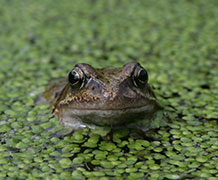
Swab samples will be taken to the lab to determine the presence or absence of the diseases. Image: shutterstock.com
Cornish pond owners recruited for study into frog killing diseases
Pond owners across Cornwall are being sought by a student at the University of Exeter’s Penryn Campus who is conducting research into whether two deadly frog diseases can be found in the county.
Ali North hopes to determine if two diseases of extreme concern for amphibians globally – chytrid fungus and ranavirus – are present in Cornwall, and to better understand what drives the spread of the latter infection.
She is looking for willing pond owners from across the county who have frogs, toads or newts at their sites and who would be happy for her to conduct surveys there. If possible, reporting when they start to spot the creatures, when tadpoles start hatching and whether any amphibian mortalities are seen.
Ali said: “Chytrid fungusis a leading cause of amphibian extinctions worldwide and is known to be present in the UK through nationwide surveys conducted in 2008 and 2011. However, we know very little about the distribution of chytrid in Cornwall and so this study, with the help of willing pond owners, hopes to determine how far spread it is in our county.
“Ranavirus is also found in the UK and is known to cause population declines in Common frogs. Mortality records suggest its presence in Cornwall and so this project aims to confirm this. Mapping the presence of these diseases and understanding why they spread is crucial to determine whether our Cornish populations might be impacted and to enable a plan of action to be made.”
Ali is an MSc student from the University of Exeter conducting the research at the Environment and Sustainability Institute in Penryn with Dr Amber Teacher. She is working in collaboration with UK amphibian charity Froglife.
The project will involve her surveying for the diseases in Cornish ponds by collecting swab samples of adult amphibians for chytrid, and looking at tadpoles for ranavirus. These samples will then be taken to the lab for analysis to determine the presence or absence of the diseases.
If pond owners feel able to collect any amphibian mortalities they witness at their ponds, Ali will collect them in order to determine the cause of these deaths.
She is particularly keen to hear from pond owners located to the west of Falmouth.
The information gathered will be helpful to Cornwall but will also have wider relevance. Analysis of nationwide ranavirus mortality data aims to provide new information on the drivers of this disease that may be able to help in mitigating its spread.
Ali can be contacted on: acn202@exeter.ac.uk or 07712 114448.
The ESI is working with businesses and enterprises across all sectors of the economy in Cornwall, the Isles of Scilly and beyond to translate research and expertise into innovative business practices, products and services in order to respond to the challenges of environmental change. It has been funded by the ERDF Convergence Programme (£22.9M) and the South West Regional Development Agency (£6.6M), with significant support from the Higher Education Funding Council for England.
Date: 5 March 2014
